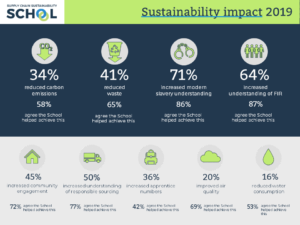Becoming the UK’s leading national sustainable housebuilder
Barratt Developments, the UK’s largest housebuilder, has announced its sustainability performance figures in its new annual report.
The figures show that Barratt is fast becoming the leading national sustainable housebuilder and is making strong progress on the ambitious targets that it set back in 2015.
These targets form part of Barratt’s sustainability strategy covering health and safety, skills, placemaking, responsible sourcing, innovation, and diversity and inclusion. Responding to the ongoing skills crisis, Barratt has also had success in bringing new trainees into the industry this year by recruiting 204 graduates, apprentices and trainees.
Operational carbon emissions relative to build area have fallen by 21% since 2015, meaning it has hit its target some seven years early.
Overall, the group’s carbon emissions have reduced this year from 2.17 tonnes per 1,000 sq ft to 1.87 tonnes of CO2e[1].
The fall in carbon emissions stems from 20% reductions in both electricity and gas use across the group, through energy reduction programmes such as more efficient site cabins and new lighting in sales offices and in its furniture factory. The fall in carbon emissions is not all down to Barratt however, as the greening of the UK’s electricity grid has also had a positive effect. Following the success in this area Barratt will now look to set a target for UK carbon reductions going forward.
A particular focus over the last two years has been to reduce construction waste. Since 2015 Barratt has reduced the amount of construction waste relative to build area by 15%, a stand-out achievement from the UK’s largest housebuilder. One of the most successful waste reduction initiatives has been working with British Gypsum to optimise the size of plasterboard used. This is estimated to have saved 621 tonnes of a type of waste that is particularly difficult to dispose of, plus reducing the amount of energy and raw materials required to manufacture plasterboard in the first place.
Barratt has also been working with its subcontractors and the Supply Chain Sustainability School to improve its environmental performance by supporting 8 regional sub-contractor breakfast events. The group’s construction materials suppliers have begun to remove unnecessary packaging and plastics, including plastic packaging on timber trusses and around kitchen doors.
Building on many years of waste segregation on site, Barratt has worked with subcontractors and suppliers to recycle things like 15,000 paint tins and 250,000 wooden pallets. As a result 97% of all construction waste is now being diverted from landfill, a rise of 2% from last year.
The group has also updated several of its policies, including climate and sustainability, by aligning them with the group’s issues that matter most, meaning that supply chain impacts and commitments to a low carbon future are prioritised. Building on key achievements around biodiversity and nature through its partnership with the RSPB, Barratt has updated its ecology and biodiversity policy to reinforce best practice by avoiding harm, and improving habitats through planting guidelines set out in its ‘Growing with Nature’ guide.
David Thomas, chief executive at Barratt Developments, said: “We strive to be the leading national sustainable housebuilder which is why we set ourselves such demanding targets. The group’s sustainability targets are not a distraction or barrier to strong financial performance. Instead, they are integral to our business success, both in the short and long term.”





Recent Comments
with Flannery Plant Hire as the first signatory